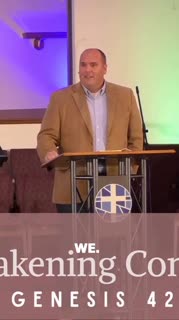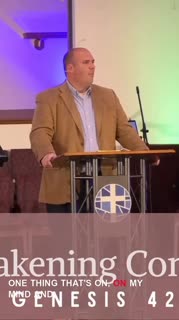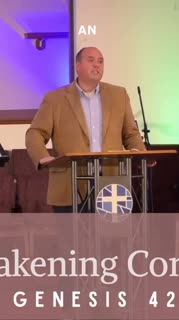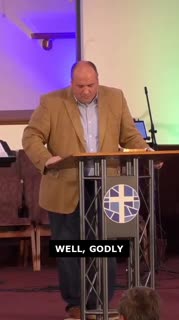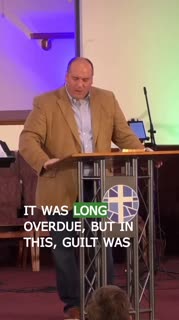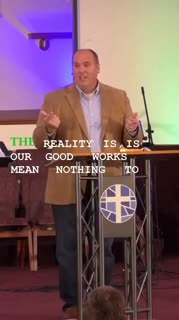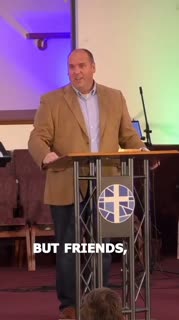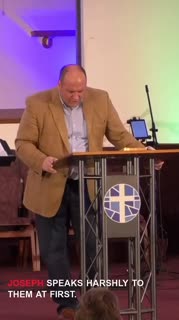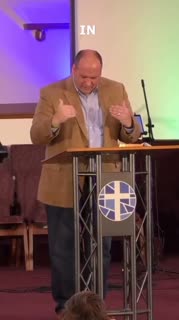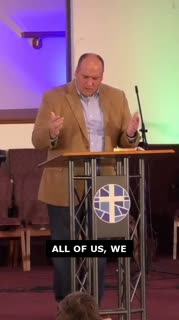Embracing Guilt: A Path to Redemption and Responsibility
Devotional
Sermon Summary
Bible Study Guide
Sermon Clips
1. "We are probably inundated with all the ads and the signs and the things that we could ever get. But hopefully the reminder to you is that Tuesday is voting day. And if you haven't voted early or by absentee vote, we hope that you would do so Tuesday. Please make sure that as Christians that we vote our values. Some say over 50 % of Christians will not vote. And that's a travesty as the Lord has given us an opportunity to speak and choose our Caesar, so to speak. And so I hope that you'll do that out in the pew out, excuse me, out in the foyer. There is some information from the family foundation that we handed out last week. Plus their citizen, uh, newspaper, monthly paper that handles all the issues from the, um, election. So if you want to be researched up on those topics, you can catch one of those on the way out. But we hope that you do plan to make time to vote on Tuesday." [00:34:25] (57 seconds)
2. "One thing that's on, on my mind and heart as I think about this is, especially being a Baptist, is religious liberty is actually on the ballot on Tuesdays. Uh, as, as Baptists, we have a rich history going back many centuries for those who believe in believers' baptism. Meaning that baptism doesn't save, but is a, a following our salvation. Both in Europe and in America, that those who hold to that were taxed. Uh, were, uh, imprisoned and were killed, uh, drowned for that belief. Uh, Rhode Island was founded because of that. Uh, and the rest of our country now we know in the Bill of Rights have religious liberty. And partly because of us Baptists. John Leland, a, a, a Virginia pastor, uh, threatened, uh, Madison and others that he would run against them if that was not a first order issue. And so, uh. Thankfully, because of that, in Baptist, that religious liberty is something that we benefit from as a church, as Christians, and as a country." [00:35:05] (70 seconds)
3. "Friends, this is an important thing. So as Christians, we don't have an option of sitting at home. Because we have an opportunity to speak truth into our world. And we know it's gonna get worse before it gets better. Things aren't gonna go the way that we want it to. But we do know the lion is king. And Jesus will reign. Jesus will reign Tuesday and Wednesday evening. Even if our party doesn't win. Or the person you want to win doesn't win. And we know that Jesus will reign no matter what. And we're thankful that our hope is in him. So that's the sermonette. Are you ready for the sermon?" [00:39:22] (40 seconds)
4. "Well, godly guilt is our conscience, an alert to sin in our life that must drive us to restoration and reconciliation to God. Here in Genesis chapter 42, we're diving into the part of the story of Joseph where he's reunited with his family. And here we see the brothers who had sold him into slavery brought to him by God's plan that we knew from the very beginning that they would have to bow down to Joseph. Little did they know that it was going to be forced by famine in the land. But in this, it was where the guilt starts to work in their life. It started to unearth the sins they had long ignored and buried for many years. It was over decades that they had come to see the face to face that they needed to be reminded through their guilt that restoration to God and their brother was possible." [00:44:58] (65 seconds)
5. "It was long overdue, but in this, guilt was bringing them to God himself. You see, guilt, as uncomfortable as it feels, is a tool that God uses us to awaken us to sin, but most importantly, to draw us to the mercy found in him. Often we respond to guilt in one of two ways. In one way that we respond poorly to guilt is that we ignore it and begin to build a fence against it. That we start to lay out all the good that we've done to help us ignore the bad that we're feeling about in that moment. That we start to say, well, I'm not as bad as that person or look at all the good things that I've done here. Surely I shouldn't feel that bad about this sin." [00:47:34] (58 seconds)
6. "The reality is, is our good works mean nothing to God. If we are in sin, we are separated from him and our good works doesn't bring us into right standing. Any sin we're guilty of against God. So we can't ignore sin, we can't ignore our guilt. On the other hand, the way that we react to guilt in a poor way is that we let it consume us. We sit there feeling defeated. We wallow in our self -pity. It drains us of joy. It keeps us and blocks us away from any restoration. We think that we can never be good again or that we never can be lovable again." [00:49:14] (48 seconds)
7. "But friends, guilt is meant to draw us to God so that we see the joy that comes from Christ, the mercy that is in him, so that we come freely to him, so that the weight is lifted off and that we realize that we have a new way to live in Christ. So today, brothers and sisters, we need to understand what biblical grace, guilt looks like, how it's good, how God uses it in a way to restore us, encourage us, and call us to repentance and repair our relationship with him and others. Today, let's explore how God uses guilt as a gift to bring out things that are in the hidden places of our hearts that will lead us to his heart where we can find forgiveness." [00:50:22] (50 seconds)
8. "Joseph speaks harshly to them at first. He has this way to say, I need to find out where my brother's hearts are right now. I know where they were, where they were 30 years ago or 20 years ago. I know what they were like then. I want to know what God's been doing in their heart. Are they any different? Have they changed? Do they feel bad about what has happened? What is going on in their life? So he treats them harshly. He accuses them of being spies. He tests their integrity. And he then puts a test before them to say, I'm going to let you go back to your land, but you've got to leave one of the brothers here and you've got to bring Benjamin, my birth brother, by my mother, home to see me. I want to see him. I haven't seen him in this many years." [00:52:31] (46 seconds)
9. "In this moment, we start to see that the brothers were being confronted with the guilt in their life. They started to actually see and acknowledge their wrongdoing. In verse 21, they start to see, hey, look, we're guilty of this. Why did this happen to us? In verse 21, we did not listen. We sold our brother into slavery. They become face to face with the consequence of their actions. They're starting to feel guilty. And this is the first step towards righteousness. They begin to see that reconciliation with God is something they need." [00:56:24] (38 seconds)
10. "All of us, we see the grace of guilt that's happening in their life. It is awakening them to see what is broken and calling them to look to God to restore it. Friends, that is the gift of guilt in your life. It is the gift of God to come into your hearts and your conscience and say, hey, something is broken. Come to me so that I can mend it. You know, we all have this in our cars. There's a warning light, right? There's a warning light of engine problems. You can see that light and you can ignore it. If you ignore it too long, you ignore it too long, bad things happen." [00:58:33] (55 seconds)
Ask a question about this sermon
2. "One thing that's on, on my mind and heart as I think about this is, especially being a Baptist, is religious liberty is actually on the ballot on Tuesdays. Uh, as, as Baptists, we have a rich history going back many centuries for those who believe in believers' baptism. Meaning that baptism doesn't save, but is a, a following our salvation. Both in Europe and in America, that those who hold to that were taxed. Uh, were, uh, imprisoned and were killed, uh, drowned for that belief. Uh, Rhode Island was founded because of that. Uh, and the rest of our country now we know in the Bill of Rights have religious liberty. And partly because of us Baptists. John Leland, a, a, a Virginia pastor, uh, threatened, uh, Madison and others that he would run against them if that was not a first order issue. And so, uh. Thankfully, because of that, in Baptist, that religious liberty is something that we benefit from as a church, as Christians, and as a country." [00:35:05] (70 seconds)
3. "Friends, this is an important thing. So as Christians, we don't have an option of sitting at home. Because we have an opportunity to speak truth into our world. And we know it's gonna get worse before it gets better. Things aren't gonna go the way that we want it to. But we do know the lion is king. And Jesus will reign. Jesus will reign Tuesday and Wednesday evening. Even if our party doesn't win. Or the person you want to win doesn't win. And we know that Jesus will reign no matter what. And we're thankful that our hope is in him. So that's the sermonette. Are you ready for the sermon?" [00:39:22] (40 seconds)
4. "Well, godly guilt is our conscience, an alert to sin in our life that must drive us to restoration and reconciliation to God. Here in Genesis chapter 42, we're diving into the part of the story of Joseph where he's reunited with his family. And here we see the brothers who had sold him into slavery brought to him by God's plan that we knew from the very beginning that they would have to bow down to Joseph. Little did they know that it was going to be forced by famine in the land. But in this, it was where the guilt starts to work in their life. It started to unearth the sins they had long ignored and buried for many years. It was over decades that they had come to see the face to face that they needed to be reminded through their guilt that restoration to God and their brother was possible." [00:44:58] (65 seconds)
5. "It was long overdue, but in this, guilt was bringing them to God himself. You see, guilt, as uncomfortable as it feels, is a tool that God uses us to awaken us to sin, but most importantly, to draw us to the mercy found in him. Often we respond to guilt in one of two ways. In one way that we respond poorly to guilt is that we ignore it and begin to build a fence against it. That we start to lay out all the good that we've done to help us ignore the bad that we're feeling about in that moment. That we start to say, well, I'm not as bad as that person or look at all the good things that I've done here. Surely I shouldn't feel that bad about this sin." [00:47:34] (58 seconds)
6. "The reality is, is our good works mean nothing to God. If we are in sin, we are separated from him and our good works doesn't bring us into right standing. Any sin we're guilty of against God. So we can't ignore sin, we can't ignore our guilt. On the other hand, the way that we react to guilt in a poor way is that we let it consume us. We sit there feeling defeated. We wallow in our self -pity. It drains us of joy. It keeps us and blocks us away from any restoration. We think that we can never be good again or that we never can be lovable again." [00:49:14] (48 seconds)
7. "But friends, guilt is meant to draw us to God so that we see the joy that comes from Christ, the mercy that is in him, so that we come freely to him, so that the weight is lifted off and that we realize that we have a new way to live in Christ. So today, brothers and sisters, we need to understand what biblical grace, guilt looks like, how it's good, how God uses it in a way to restore us, encourage us, and call us to repentance and repair our relationship with him and others. Today, let's explore how God uses guilt as a gift to bring out things that are in the hidden places of our hearts that will lead us to his heart where we can find forgiveness." [00:50:22] (50 seconds)
8. "Joseph speaks harshly to them at first. He has this way to say, I need to find out where my brother's hearts are right now. I know where they were, where they were 30 years ago or 20 years ago. I know what they were like then. I want to know what God's been doing in their heart. Are they any different? Have they changed? Do they feel bad about what has happened? What is going on in their life? So he treats them harshly. He accuses them of being spies. He tests their integrity. And he then puts a test before them to say, I'm going to let you go back to your land, but you've got to leave one of the brothers here and you've got to bring Benjamin, my birth brother, by my mother, home to see me. I want to see him. I haven't seen him in this many years." [00:52:31] (46 seconds)
9. "In this moment, we start to see that the brothers were being confronted with the guilt in their life. They started to actually see and acknowledge their wrongdoing. In verse 21, they start to see, hey, look, we're guilty of this. Why did this happen to us? In verse 21, we did not listen. We sold our brother into slavery. They become face to face with the consequence of their actions. They're starting to feel guilty. And this is the first step towards righteousness. They begin to see that reconciliation with God is something they need." [00:56:24] (38 seconds)
10. "All of us, we see the grace of guilt that's happening in their life. It is awakening them to see what is broken and calling them to look to God to restore it. Friends, that is the gift of guilt in your life. It is the gift of God to come into your hearts and your conscience and say, hey, something is broken. Come to me so that I can mend it. You know, we all have this in our cars. There's a warning light, right? There's a warning light of engine problems. You can see that light and you can ignore it. If you ignore it too long, you ignore it too long, bad things happen." [00:58:33] (55 seconds)
